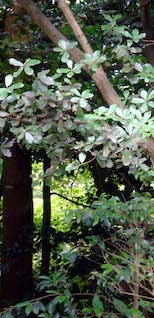Jodo Wasan 107
Shinjin that is the inconceivable working of the power of the Vow
Is none other than the mind aspiring for great Enlightenment;
The evil spirits that abound in heaven and earth
All hold in awe the person who has attained it.
On Being Naked
The beginning of the love of wisdom... is a consciousness of a man's own weakness and impotence with regard to the things of real consequence in life.1
The quest for wisdom is the quest for truth and it means living in the light. Jodo Shinshu is pre-eminently a religion of light, wisdom and truth (Sk. satya). It is the true (shin) religion. Amida Buddha's shinjin in Shinran's teaching is truth. The Path of Sages, the bodhisatva way, emphasises compassion (Sk. karuna). This can be seen, for example, in the sublime verses of Shantideva. The bodhisattva path teaches that compassion is the basis of all good; but the Pure Land way urges us above all to stand in the light. It urges us to strip away all pretence (hakarai) and artifice; and acknowledge truth. When we actually do this we discover that there is only one reality, which is shinjin of the Vow-Power inconceivable (ganriki fushigi no shinjin). It is an absolute reality and is inconceivable because we cannot grasp it either with our minds, our hands or our scheming. We will never know it, however, unless we are willing to stand in the light. Until that time we can only cling blindly to hope.
To my way of thinking standing in the light is to surrender everything in Namo Amida Butsu; but the obstacles we face are innumerable. Of course, there are the usual obstacles and hindrances that are listed in the canons of the dharma but there are more serious, immediate and generic things that get in the way. The first is our belief that truth is relative. While relativity may apply to the conditioned (physical) world, truth is not relative. There is no way that we can escape from the Vow-Power's shinjin forever, but one way to try is to insist that Jodo Shinshu is 'one among many' 'truths'. However, the Vow of Amida Buddha is absolute. If it were only a relative truth it would be quite useless.

Another habit of thought, which serves as an obstacle to discovering truth, is to attach ourselves to 'views' (Sk. drshti). We do this when we allow texts and dharma teachers to become objectified. Truth is most clearly revealed in dialogue, rather than by the assertion of authority. If we are reading Shinran Shonin's writing, for example, we need to do so in such a way as to be present before him unclad. All our scars and hurts, our fears and misgivings ought to be open before the light of his wisdom. If we take his teaching as a badge to wear, a directive for our way of life, a weapon to use in an argument, or something to clothe our actual vacuity; it will be of no use. The same can be said of the teachings of Shakyamuni or any sage. In meeting Shinran in his writings we need to be present with our honest selves.
When I talk about being naked, I mean 'profoundly honest'. This is not the same as being truthful. An honest person knows how untruthful he is. Truthfulness is one of those virtues which can be used to hurt other people and it does indeed belong - like all conventional morality - to the realm of relativity. To be profoundly honest, naked, is to come into the light with all our scars exposed. If Shinran affronts, be affornted; if he inspires, be inspired; if he causes us frustration and anger, be frustrated and angry.
Of course, deep self-honesty can become a kind of artifice, and sort of garment, too. We might think that nakedness involves exposure of our deepest, darkest secrets to the world. This, of course, is the stuff of scandal, shock and self-assertion and has nothing to do with being completely naked. Exhibitionism is a disposition which many of us are inclined to but it is only a characteristic of ego-centricity and part of our wish to be noticed and to make an impact.
True nakedness is not spiritual nudism - after all a lot of people look attractive without their clothes on. It is deeper than that, and includes acknowledging things as they are, while not judging them as good or bad. For what we see is not our moral worth, but our vacuity, our emptiness - and in this we see Amida Buddha and hear the Call of his Vow.
The deep personal truth, this nakedness, which emerges from other power faith, is what the evil spirits fear.
Shinnin wa
isho kitamana maruhadaka.
A true man is completely naked
while fully clothed.
- Zuiken Inagaki.
1: The Discourses of Epictetus II, 21.